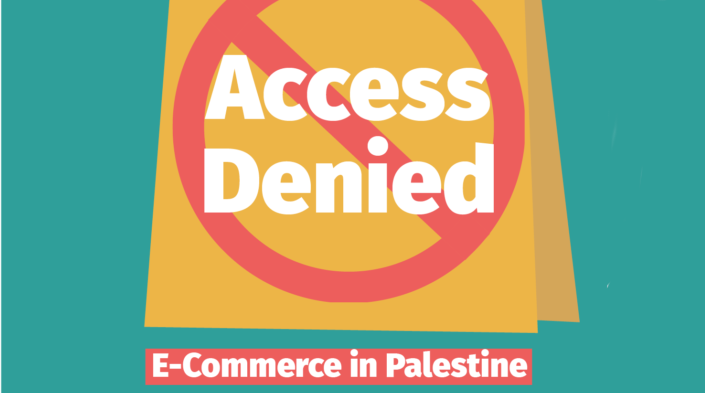 Access Denied – E-Commerce in Palestine
Access Denied – E-Commerce in Palestine
Page last updated on
7amleh – The Arab Center for Advancement of Social Media published “Access Denied – E-Commerce in Palestine.” The research highlights how occupation, failure to fulfill the Oslo Accords and digital discrimination from international tech companies have stunted the development of the Palestinian economy and created challenges for Palestinian buyers, sellers and workers online.
7amleh – The Arab Center for Advancement of Social Media published “Access Denied – E-Commerce in Palestine.” The research highlights how occupation, failure to fulfill the Oslo Accords and digital discrimination from international tech companies have stunted the development of the Palestinian economy and created challenges for Palestinian buyers, sellers and workers online. The research also shows how technology companies that provide online financial and commercial services deprive Palestinians of their right to access economic markets. It includes a review of Palestinian access to Amazon, eBay, Ali Baba/Ali Express, Etsy, Facebook, Instagram, Freelancer and UpWork.
“Access Denied – E-Commerce in Palestine ” also profiles Palestinians buyers, sellers and workers and the challenges they face when engaging with the digital economy and samples of the “work around” solutions they have devised. The research found that Palestinian e-commerce businesses have processed between 20,000 – 40,000 deliveries in 2019, and spent on average $5,000-$10,000 per business on digital marketing. Interviews also found that, in most cases, especially when buying from local vendors, consumers in the West Bank and Gaza still continue to prefer to pay with cash.
Palestinian consumers in the West Bank and Gaza face multiple logistical hurdles when buying products from international vendors. Several e-commerce platforms and marketplaces do not ship directly to the West Bank and Gaza. Instead, buyers often use P.O. Box address of contacts in Israel to ensure their products are delivered. For websites that do offer shipping to Palestine, deliveries are frequently delayed given Israel’s control over incoming mail to the West Bank and Gaza. This creates delays in business operations and increases risk, putting Palestinians at a disadvantage.
The research recommends that governments, the banking sector, and e-commerce companies work to ensure the financial inclusion of Palestinians in the digital economy by increasing digital access, financial access, integrating logistics and making necessary policy changes. It recommends that Israel must allow the Palestinian ICT sector and infrastructure to be independent and that third-party states hold Israel accountable for violations of Palestinian rights. It also recommends that the PA must work to increase access to the internet and develop policies that will protect Palestinians online that include data and privacy protections and respect for Palestinian’s under Article 12 of the 1948 UN Declaration of Human Rights. Palestinian banks must also work to enable freelancers to easily open bank accounts and introduce a ‘freelancer’/ ‘entrepreneur’ credit card, to allow holders to register and receive payments on the leading freelancing platforms.
This research is part of a series of research on Palestinian human rights in the digital space carried out by 7amleh, as an organization concerned with Palestinian digital rights. It was developed with support from the Association for Progressive Communications and was done by Zayne Abudaka and Sari Taha .
To download the full research, click here.
To download the infographic, click here.


